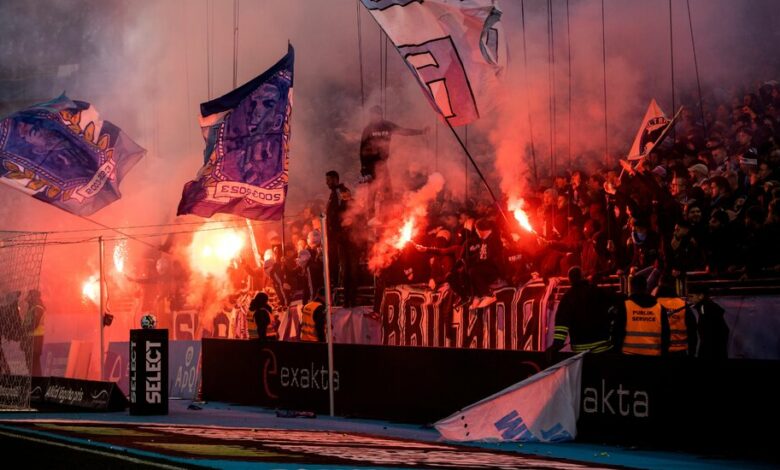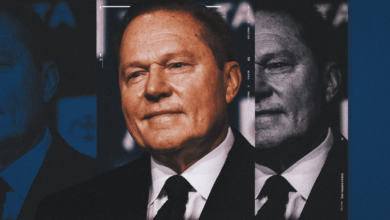Swedish football prioritized fans over finances. Now the business is booming.

The warning sounded again and again, first in Swedish and then in English. A fire had been detected. Please clear the stadium. The players left the field. Firefighters arrived outside. But in the stands, as a thick cloud of smoke curled and twisted in the spotlights, no one moved. The fans would make the match happen through sheer force of will.
It was a match they had been looking forward to for some time. The top two teams in the Allsvenskan, Sweden’s elite league, had entered the final day of the season with just three points between them. A quirk of fate meant that their final match was against each other. Malmo, the hosts, had to win to claim the championship. Elfsborg, the visitors, just had to avoid defeat. It had been billed as a gold final: a gold medal match.
The idea of a single match deciding the fate of a league title is extremely rare in modern football, where championships are won over the course of a season rather than in a winner-takes-all final. England hasn’t seen such a climax since 1989, and Italy hasn’t produced such a denouement for more than half a century.
It is also increasingly unusual for a title to even be in play as the season draws to a close. Over the past three decades, football has become so financially stratified that many domestic tournaments for the wealthiest teams have become little more than months-long parades. Sweden, however, is different, a lonely beacon of competitive balance. The championship has been on the line in four of the last six editions of the Allsvenskan.
How that came about is a story of rejecting orthodoxy, of asking why sports exist and for whom they exist. But it is also a story about how difficult it is to be alone, and how fragile even the most encouraging success can be.
A different path
The walls of Malmö’s Eleda Stadium are filled with memories of the glory days, the time when Swedish teams could compete with, and sometimes even beat, the European giants.
In 1979 Malmö reached the finish line with an amateur team the European Cup final. They are still the only Scandinavian team to feature in the competition and its successor, the Champions League final. In the 1980s, IFK Gothenburg won (smaller) continental trophies twice. As recently as 1994, IFK defeated Manchester United and Barcelona in the Champions League.
Those victories proved to be a last ditch effort. The dynamics of the game changed dramatically as money poured into football in the 1990s, first from broadcasters, then from private investors, and finally from oligarchs, corporations and nation states. The wealth created a new class of unassailable domestic powers.
“Big money fed the biggest clubs,” allowing them to build teams full of superstars, said Mats Enquist, who from 2012 until early this year was general secretary of Svenskelitfotboll, or SEF, the body that runs Sweden’s professional leagues. For Sweden, like many countries outside the major European television markets, it was “impossible to keep up.”
Instead of reaching for shadows, Sweden’s response was — effectively — to withdraw. In 1999, the country passed a law requiring 51 percent of sports teams to be owned by their members: the fans. In 2007, when that rule was challenged, fans fought fiercely to protect him.
“That was the moment when fans first realized how much power they had,” said Noa Bachner, the author of a book that examines Sweden’s rejection of football’s economic orthodoxy.
Yet they wielded it in a bleak landscape.
“The audience was down, the standard of play wasn’t good, the league had a lot of problems with hooliganism,” Mr Enquist said. A survey he commissioned as one of his first acts showed that only 11 percent of fans considered the Allsvenskan their favorite league, far behind the English Premier League and the Champions League. “It wasn’t a good place to be,” he said.
Mr. Enquist was an outsider in football when he took a leading role in it: a software entrepreneur by trade, and a volleyball and golf fan by nature. But it was his job to fix it.
His solution took Sweden down an almost heretical path in modern football. Unable to turn to wealthy investors, the SEF tapped into the country’s most obvious asset: its fans. Despite considerable scepticism, the authorities “reached out to the fans,” Mr Enquist said, and set about designing a competition they wanted to watch, and watch live.
They negotiated behavioral restrictions, designating entering the field and throwing missiles as red lines, but leaving a tacit freedom for pyrotechnics in the service of the spectacle. They convinced police to take a more conciliatory approach rather than “treating all fans as potential hooligans”, as Lars-Christer Olsson, the league’s president until this year, said.
Ten years later, the transformation is staggering. Swedish football is almost alone in the middle class in Europe and is a model of health. It has had eleven different champions in twenty years. Visitor numbers have doubled in the past ten years; this year brought a record number of visitors. The league’s revenues have tripled over the same period. Now more than 40 percent of Swedish fans consider the Allsvenskan as their priority.
The match of the year between Malmö and Elfsborg should have been the perfect distillation of all that work, an illustration of what makes Sweden the standard-bearer for a different kind of football. Instead, it highlighted how thin the line is between empowering fans and losing control over them.
The start of the second half was delayed by half an hour as Elfsborg fans faced a line of riot police, and then by another half hour as Malmö’s ultras, the team’s most hardcore supporters, detonated so many smuggled fireworks that they set off the fire alarm. With Malmö’s victory secured, thousands of fans stormed onto the pitch, a handful rushing over to their Elfsborg counterparts and throwing flaming fireworks into their huddled sections.
“There is a small margin,” said Pontus Jansson, a veteran defender who returned to Malmö this year after a decade abroad to draw the curtain on his career. “They got over it.”
For fans, by fans
The moment Malmo’s players and staff claimed their title — two hours later, when all the smoke had cleared — was a domestic affair. They walked out in small groups to collect their medals, in velvet presentation boxes, from a folding table. There were no glitter cannons or smoke machines behind them.
Instead, the photo that will one day grace the walls, along with all the other reminders of past successes, captured the two elements that make up the club: the players and the fans, gathered on the pitch behind them.
Everything that Swedish football has become has been built by and for the people who go to watch it in stadiums. Mr. Bachner, the author, cites the beginning of a long list of examples: the absence of corporations, sovereign wealth funds and “multi-club projects” in the ranks of club owners; sustainable investments in women’s teams; an unofficial ban on holding training camps in authoritarian states; a rule stating that the league must give at least two months’ notice before rescheduling televised games.
The clearest example, however, is that Sweden – alone among the major European countries – has resisted the introduction of video assistant referees. Clubs, at the urging of their members, have consistently voted against the technology, which is a source of controversy elsewhere due to its frequent errors and interminable delays.
“I think the fans feel that it disrupts the atmosphere in the stadium,” Olsson said.
There are things that the Swedish democratic tradition cannot vote out of existence. Malmö’s championship, for example, means another potential infusion of Champions League revenue that could be enough to give the club — already Sweden’s richest — an insurmountable competitive advantage.
The issue of ultras also poses a problem. “It feels like there are two games happening,” Mr. Bachner said. “One on the field and one in the stands, where these groups see how they can demonstrate their power, and they don’t mind if 20,000 other people have to wait while they do it.”
Sweden is not the only country facing this challenge, but Mr Bachner acknowledged concerns that the chaos on the season’s showcase day would lead to calls for more aggressive policing, which could threaten the delicate alliance between authorities and fans .
For many that would be a step back. “It may not be the best competition in Europe,” said Johan Lindvall, the league’s general manager, “but the atmosphere in the stands is.” Matchdays are both the cornerstone on which all success is built, and the testament to how far it has come.
“After we scored the goal, the noise was crazy,” Mr Jansson said. His presence alone is an example of this. Over the past seven years he had become part of the furniture of English football. He’s only 32 and could still be playing there, among the Premier League’s superstars. Instead, he chose to come home in April to experience what Swedish football had become.
“That atmosphere,” he said. “That’s what brought me back.”




